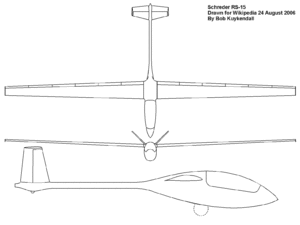PlaneSpottingWorld welcomes all new members! Please gives your ideas at the Terminal.
Schreder RS-15
| Type designation | RS-15 |
| Designer | Richard Schreder |
| Competition class | Club (formerly 15 metre) |
| Crew | 1 |
| Length | 22.0 ft (6.71 m) |
| Wingspan | 49.2 ft (15 m) |
| Wing area | 113 ft² (10.5 m²) |
| Aspect ratio | 21.4 |
| Wing profile | Wortmann FX 67-K-170 |
| Empty mass | ca. 440 lb (200 kg) |
| Water ballast | 200 lb (90 kg) |
| Maximum mass | 940 lb (426 kg) |
| Wing loading | 8.30 lb/ft² (40.5 kg/m²) |
| Maximum speed | 150 mph (241 km/h) |
| Maneuver speed | knots ( km/h) |
| Speed in strong turbulence |
120 mph (193 km/h) |
| Minimum sink rate | ca. 126 ft/min (0.64 m/s) |
| Best glide ratio | ca. 38 at knots ( km/h) |
The RS-15 is a Richard Schreder-designed metal Racing Class sailplane that was offered as a kit for homebuilding during the 1970s and 1980s.
Description
The dominating aesthetic feature of the RS-15 is its pod-and-boom fuselage. The forward fuselage is a composite molding, and the aft portion is a 6" diameter aluminum tube. The V-tail is essentially the same as on other contemporary Schreder sailplanes, differing only in detail design from that of the HP-18.
Unlike Schreder's HP-series gliders, the RS-15 was intended to achieve more modest performance, sacrificing performance for a shortened build time.
Early RS-15 models featured wings that were essentially the same as the HP-16, and using the same one-piece machined aluminum I-beam wing spar. Later units were supplied with wing kits nearly identical to those of the HP-18, using that ship's riveted aluminum box spar. Unlike the HP-18, however, RS-15 examples usually lack the flap/aileron interconnect that adjusts the neutral aileron deflection to match that of the flap in the range of -10 to +10 flap deflection.
Major features:
- Pod-and-boom fuselage with relatively deep cockpit
- V-tail that folds upwards for easy storage
- Wing structure composed of spars with caps pre-machined from solid aluminium plate and aluminium wing skins bonded to closely spaced foam ribs
- Fiberglass fuselage pod, wing tip skids and tail fairings
- Tubular aluminum aft fuselage
- Winglets added by some homebuilders
- Water ballast carried inside the hollow aluminium wing spars
- Typical Schreder trailing edge flaps/airbrakes
Designation series
HP-7 - HP-8 - HP-10 - HP-11 - HP-12 - HP-13 - HP-14 - HP-15 - HP-16 - RS-15 - HP-17 - HP-18 - HP-19 - HP-20 - HP-21 - HP-22

